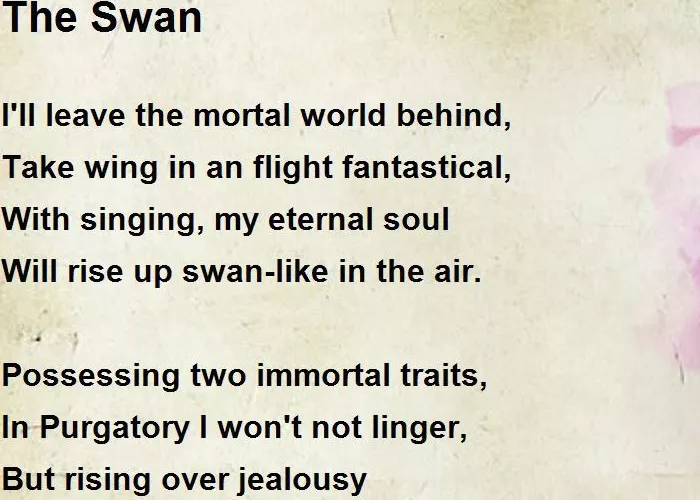Welcome to Poem of the Day – The Swan by Gavrila Derzhavin.
Gavrila Derzhavin, a towering figure in Russian literature, is renowned for his ability to interweave grandeur with intimacy. Among his many poetic achievements, The Swan stands out as a masterful exploration of beauty, mortality, and transformation. This essay delves into the poem’s themes, structure, and enduring appeal, offering insights into how Derzhavin employs the swan as a symbol of both earthly and transcendent realms.
The Swan as a Symbol
In The Swan, Derzhavin uses the titular bird as a potent symbol of purity, grace, and impermanence. In various cultures, the swan is often associated with beauty and the ethereal, frequently bridging the gap between the mortal and divine. Derzhavin capitalizes on these associations to explore humanity’s quest for meaning amidst the inevitability of death. The swan, gliding serenely on still waters, becomes a metaphor for the soul’s journey through life and into the afterlife. Its elegance is juxtaposed against the transient nature of existence, embodying the tension between fleeting beauty and eternal aspiration.
The Swan Poem Explanation
A central theme in The Swan is the fleeting nature of life. Derzhavin reflects on the swan’s dual existence: a creature of the earth yet seemingly detached from it, soaring above the mundane and embodying the sublime. This duality mirrors humanity’s own existential struggle—our longing for immortality despite being tethered to a mortal coil. Through the swan, Derzhavin evokes an image of serene acceptance, suggesting that true beauty lies in embracing the inevitable.
Moreover, the poem delves into the theme of artistic immortality. The swan’s song, often mythologized as a final, mournful melody, serves as a metaphor for the poet’s own legacy. Just as the swan’s song lingers after its departure, Derzhavin implies that art can transcend the limits of time, preserving the essence of the creator’s spirit.
Structure and Style
Derzhavin’s mastery of poetic form is evident in the intricate structure of The Swan. The poem’s rhythmic elegance mirrors the graceful movement of its titular subject, creating a harmonious interplay between content and form. His use of vivid imagery brings the swan to life, allowing readers to visualize its movements and feel the poignancy of its symbolic flight.
For example, the serene waters described in the poem reflect the tranquility of the swan’s presence while also serving as a metaphor for the stillness of eternity. Derzhavin’s choice of language is deliberate, blending lyrical beauty with philosophical depth. The swan’s whiteness, often emphasized in the text, becomes a canvas upon which the poet projects ideas of purity, divine grace, and the inexorable passage of time.
Derzhavin’s Philosophical Undertones
What sets The Swan apart from simple descriptive poetry is its profound philosophical undertone. Derzhavin invites readers to ponder life’s ephemeral nature while finding solace in the continuity of the spiritual realm. The swan’s journey, from the quiet lake to the boundless sky, is an allegory for the soul’s transition from the physical world to a higher plane of existence.
This philosophical dimension resonates with Derzhavin’s broader oeuvre, where he often grappled with questions of existence, divinity, and the nature of artistic creation. In The Swan, these themes coalesce into a meditation on the poet’s own mortality, as he seeks to reconcile his human limitations with the timelessness of his art.
Enduring Appeal
The enduring appeal of The Swan lies in its universal themes and the timeless elegance of its execution. While rooted in the cultural and philosophical milieu of 18th-century Russia, the poem’s exploration of beauty, mortality, and artistic legacy transcends its historical context. Readers across generations are drawn to its poignant imagery and profound insights, finding in it a reflection of their own struggles and aspirations.
Derzhavin’s ability to encapsulate complex ideas within a seemingly simple metaphor ensures that The Swan remains a cornerstone of Russian poetry. Its graceful lines and deep philosophical resonance invite endless interpretation, making it a work that rewards repeated readings and contemplation.
Conclusion
Gavrila Derzhavin’s The Swan is more than a poetic depiction of a graceful bird; it is a profound meditation on life, death, and the enduring power of art. Through the swan, Derzhavin captures the essence of human experience, weaving together beauty and fragility in a tapestry of lyrical brilliance. As a testament to his literary genius, the poem continues to inspire readers with its timeless message: that even in the face of mortality, there is beauty, grace, and the promise of transcendence.

